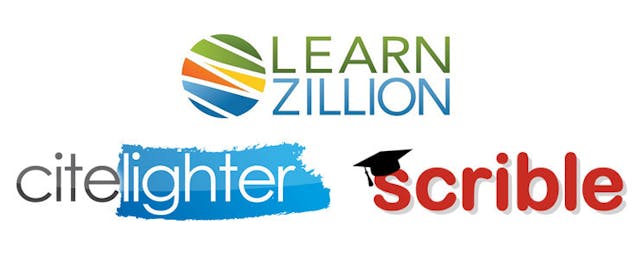Oh, the pressure. Amid all the hubbub of ISTE, startup teams pitched themselves.
Twenty teams were winnowed down to six for Wednesday’s final round: Citelighter, LearnZillion, LivingTree, Scrible, UClass, and Zondle. Participants were given five minutes to pitch and three minutes to respond to questions from the judges. The five judges included EdSurge’s contributing writer, Katrina Stevens, industry expert Steve Hargadon, Pearson's Tom Hall, HP's Jeannette Weisschuh, and Richard Culatta, Acting Director, Office of Educational Technology, U.S. Department of Education. (Judges receive no compensation for taking part in the competition.) The event was organized by UK-based Edmix.
Drumroll please--and the top prize was taken by LearnZillion, which added yet another notch in its decorated belt. (It's secured $9.4 million in funding so for LearnZillion this competition is more about exposure than the prizes.)
LearnZillion continues to be both a crowd pleaser and judge favorite. This startup’s teacher-led team is building its foundation on the recognition that teachers need and want job-embedded, content-focused PD, especially as schools prepare for the Common Core. Its Professional Learning in the Learning Profession Status Report, a must read for anyone working on professional development (especially the Key Findings on page 5), stresses the importance of just this kind of sustained professional development directly related to practice.
As LearnZillion adds to its current stack of 5,000 lessons and creates 300 new tutorials and short PD videos, it will need to continue to work hard to maintain the high quality of each lesson to avoid the curation and quality control issues that have plagued many lesson planning and professional development startups. Content creation is difficult, time consuming, and requires significant domain expertise; it’s also immensely critical and will impact student learning significantly. LearnZillion’s model of using a combination of master teachers and tight quality controls seems to be working.
Scrible (2nd place) and Citelighter (3rd place) have faced off before, most recently at the Milken-Penn GSE Competition. In crowded spaces such as the one both of these startups occupy, it’s crucial for teams to differentiate themselves--in the marketplace as well as in competitions. Both startups clearly have strong teams with technical expertise; both are gaining traction. Scrible’s new partnerships, particularly with Evernote, helped Scrible pull ahead in this particular competition. When Steve Hargadon, founder of Classroom 2.0, announced Scrible’s 2nd place award, he led with: “You had me at Evernote.”
Along with the usual questions from the judges focused around revenue and business models, the Dept. of Ed's Richard Culatta pushed many of the teams to clarify exactly what data was being collected and how it was being used to improve student learning. Edtech startups will likely continue to face questions about the security of the data they capture, as well as how that data specifically drives student learning.


